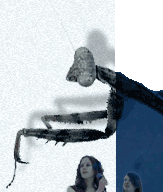|
Wednesday, September 23, 2009
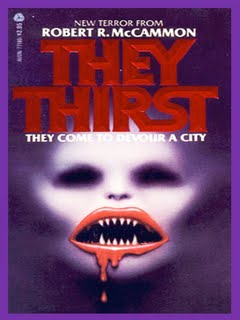 I haven't always been the bastion of tact that you see before you. No, I was a snob about a lot of things early on in my life. And horror books were among them. I read science fiction, thank you, and I certainly didn't need that trashy horror in my reading diet. I haven't always been the bastion of tact that you see before you. No, I was a snob about a lot of things early on in my life. And horror books were among them. I read science fiction, thank you, and I certainly didn't need that trashy horror in my reading diet.
So it was with that obstinate mindset that I first encountered the name, Robert (R.) McCammon. I was hanging out at an apartment I shared with a few guys. And I had my science fiction books around. I was talking to some girl whose name is long forgotten. She had read some decent books and she made a recommendation to me. It was a big, thick horror novel called They Thirst, by some guy named McCammon. 
I'm afraid I was probably pretty rude. I didn't bother to accept it and I doubt that I was very gracious in my refusal to read it.
I was an asshole.
I had no indication that the writer of They Thirst, Robert McCammon, would later become not only one of my favorite writers, but the one I consider to be the very best writer that ever labored in my chosen favorite field of literature.
Fast forward a few years. I had kicked some sense into my own head and realized that I was and, whether I had known it or not, always had been a horror fan. Stephen King and Charles Grant brought me around and my passion for dark fiction was fortified by amazing writers like Peter Straub, Ramsey Campbell, Alan Ryan, T.M. Wright, James Herbert and many others.
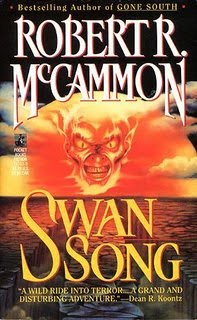
I never forgot that cheesy cover to They Thirst, or the author's name. It's not the type of image I would ever like to see on postcards. For a while I still dismissed him. Then I read a review of Swan Song in The Twilight Zone Magazine, which at the time was my bible of the genre. Edward Bryant is, to me, the finest reviewer in the genre's history and he gave Swan Song a glowing recommendation. That was enough for me. More than enough, in fact.
I guess you know by now that Swan Song blew me away. It covered some of the same ground as Stephen King's magnum opus, The Stand, but it was no mere imitation. McCammon had his own distinctive literary voice and there was so much heart in the story. From the day I began reading Swan Song, I was a Robert McCammon fan.
Swan Song was a milestone in McCammon's career at that point, but he wasn't about to rest on his laurels. Robert McCammon followed it up with Stinger, which is still one of the most entertaining books I've ever read.
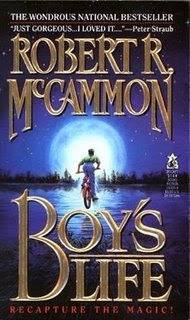
The books continued to get better: The Wolf's Hour, Blue World, Mine. And then McCammon delivered a novel that made its way into more readers' top favorite book slot than any other I know of. It is, of course, Boy's Life. A miracle of imagination and depth, Boy's Life is a magnificent novel of youth and dreams. Though it brings to mind other stories like Something Wicked This Way Comes and Stand By Me/The Body, Boy's Life stands alone. I truly believe that I'll never love a book more than it.
After Boy's Life came Gone South, a book that is drastically different in tone than anything else McCammon had previously done. In fact it reminded me of another southern writer's work: Joe R. Lansdale.
Then, nothing. Robert McCammon became a mystery man in the genre. Where was he? I heard rumors. He had retired. He was writing historical romance. He was fed up with the publishing industry and no longer wanted any part of it.
Possibly there was truth to all of those, but I guess I'll never really know. The one thing I was sure of was this: The absence of Robert McCammon in the genre left a gap that no other writer could fill. For my money Robert McCammon was and is the very best that we have ever known.
Ten long years passed from Gone South to McCammon's next book. I of course never forgot him, but I had practically given up hope that he would return to publishing. So it was with great joy when I learned that a new book was coming at last. 2002 saw the publication of an all-new novel from the master. It was called Speaks the Nightbird and a small outfit called River City Publishing did the hardcover.
I was so excited that I did something that I rarely do: I purchased an Advance Reading Copy prior to the book's publication. I do not endorse the selling of ARCs by booksellers. Most especially when the book in question either hasn't come out or has recently been published. The author gets no royalty from such a sale and only an unscrupulous dealler will sell them. But man, I had to have it. And I definitely purchased a hardcover when they came out. What kind of a guy would I be if I didn't support one of my favorite writers?
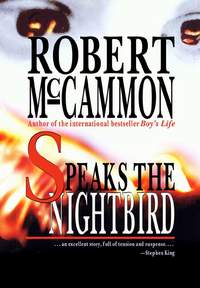 Speaks the Nightbird is a historical novel with mildly horrific overtones. Taking place in the late 16th Century, the novel deals with an earnest young legal clerk named Matthew Corbett who accompanies a magistrate to a town to determine whether an accused young woman is or isn't a witch. It's a rich work, that had to have been meticulously researched. It is also one of the best books I read in 2002. Or, to be accurate, my entire life. Speaks the Nightbird is a historical novel with mildly horrific overtones. Taking place in the late 16th Century, the novel deals with an earnest young legal clerk named Matthew Corbett who accompanies a magistrate to a town to determine whether an accused young woman is or isn't a witch. It's a rich work, that had to have been meticulously researched. It is also one of the best books I read in 2002. Or, to be accurate, my entire life.
If I still considered Boy's Life to be my favorite Robert McCammon book, then I felt that Speaks the Nightbird was probably his best novel.
The news that followed was good. McCammon would continue on with the education and adventures of Young Master Corbett in a series of novel. Good news? Heck, make that the best news the genre had heard in a long time.
The second book in the Corbett series is called The Queen of Bedlam and it is, if anything, even better than Speaks the Nightbird. In this one, McCammon focuses more on criminal behavior of the time, which is now early in the year 1703. He paints a portrait of a syndicate of criminals plotting the course of The New World. The Queen of Bedlam is a thrilling, sweeping saga that firmly established Matthew Corbett as one of the finest literary creations of our time. It ended on a nice, juicy cliffhanger too.
As joyous an occasion that the publication of The Queen of Bedlam was, there was a small dark side. Pocket Books, McCammon's longtime publisher, didn't seem to know how to market it. When they should have given it the major push it deserved, they allowed it to falter. And worse, the hardcover was a major disappointment. It was a cheaply-made volume that resembled one of those old Science Fiction Book Club things. Spit and toilet paper.
Now, with the publication of Mister Slaughter, Robert McCammon has found what I truly hope will a permanent, lucrative home. It's with Subterranean Press.
I've been a reader of Subterranean publications for a long time. They started out sort of like Cemetery Dance Jr., but now Subterranean has evolved into one of the most important publishers of Fantasy, Science Fiction and Horror. At what point can you no longer call a publisher a 'small press'? Subterranean is doing damned nice trade editions that are as inexpensive as most other mainstream hardcovers, but are much more beautiful and sturdy.
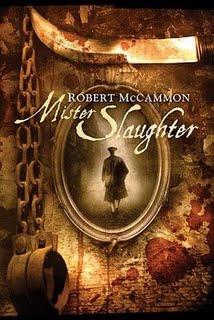 Which at last brings me to Mister Slaughter. I was privileged to be able to read an early edition of it prior to publication. And it should be no surprise that it is a real winner. Which at last brings me to Mister Slaughter. I was privileged to be able to read an early edition of it prior to publication. And it should be no surprise that it is a real winner.
My only disappointment in Mister Slaughter is that it is not as long as its predecessors. It clocks in at 'only' 440 pages, but Mister Slaughter packs a mean punch. This is the most brutal of the Corbett books so far. For Mister Slaughter himself is what would later be termed a serial killer. Or perhaps a mass murderer. He's intelligent and with cultured manners when he wishes, but Mister Slaughter is meaner and more cold-blooded than Hannibal Lector. And Matthew Corbett is saddled with the job of transporting him from an asylum in Pennsylvania to New York, where he is to be deported to England for a trial.
Corbett continues to mature, but he proves to be all-too-human and is tempted by the wormtongued Slaughter. Corbett and his associate, Hudson Greathouse, alter the course of their journey to New York based on a promise from the killer, which brings on great disaster. Facing the greatest shame of his young life, Matthew Corbett must risk everything dear to him in order to complete his task and deliver Mister Slaughter to justice.
But there's more. Far more. McCammon provides numerous subplots and the criminal conspiracy Corbett encountered in The Queen of Bedlam is still afoot. There's also a sinister bloody fingerprint on a playing card that still holds a dire portent for the young detective. Matthew's relationship with young Berry is further explored and numerous other colorful characters that readers became acquainted with in The Queen of Bedlam are featured in Mister Slaughter.
To sum up this long, rambling piece short, Robert McCammon is back with a new book, a new publisher and the future looks good for him. As well as his readers. Don't pass up Mister Slaughter and if you haven't read Speaks the Nightbird and The Queen of Bedlam, you'd better start reading. Fiction doesn't get any better than these books.
Oh, and one more thing. I eventually did read They Thirst and while I felt it was far from the best work from Mister McCammon, I had a blast with it. They Thirst is a huge, pulpy, rollicking good time.
|



